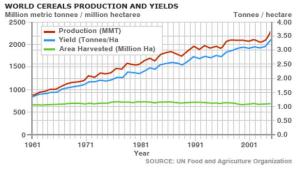The Science
Background to CAPP – Photosynthesis – RuBisCO – Carbon Concentrating Mechanisms – Algae – Pyrenoid – Experimental Techniques
The world is currently facing dramatic changes; the last century has seen enormous population growth, alongside greater exploitation of resources, habitat destruction, and destabilisation of the climate.
In order to tackle global hunger, and support growing populations across the globe, we must find a way to increase food production. These changes must be sustainable, and reliable; as this will improve global food security in the long term. As scientists there are a number of ways we are attempting to tackle these issues.
 Projects such as CAPP are essential, as increases in crop yields are going to be vital in supporting the global population in the decades to come. There can be no doubt that there are rapid changes happening to the worlds climate, which are likely to reduce crop yields. The last 50 years have seen human population growth faster than ever before; at one point the doubling time of the human race was just 34 years!
Projects such as CAPP are essential, as increases in crop yields are going to be vital in supporting the global population in the decades to come. There can be no doubt that there are rapid changes happening to the worlds climate, which are likely to reduce crop yields. The last 50 years have seen human population growth faster than ever before; at one point the doubling time of the human race was just 34 years!

Source: BBC website
Due to the Green Revolution, large increases in crop productivity occurred between the 1940s and 1980s, which supported this population growth. The Green Revolution has allowed us to more than double the amount of food we can produce per unit land area, since the 1940s. Unfortunately this change was not worldwide, and it is not enough. One of the most important problems in plant science today is how to further improve crop productivity, and produce more food for the world, in a sustainable way.
Our project aims to discover the exact process by which algae photosynthesise, as it is much more efficient than many crop plants. We will be attempting to modify the model land plant (Arabidopsis thaliana) to incorporate the algal mechanism for carbon dioxide capture and sugar production using light energy from the sun.
The links at the top of this page contain information on the science underlying our research, for online learning. More targetted teaching resources for GCSE to Undergraduate level can be found here.